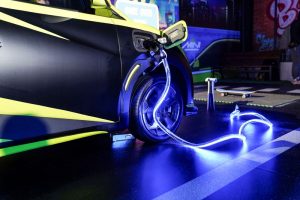China’s electric vehicle maker BYD is growing sales at such a furious pace that it is closing on FAW-Volkswagen to become the top carmaker in the country.
BYD, backed by Warren Buffett’s Berkshire Hathaway, grew sales by almost 257% year-on-year in May to 113,768 units as the nation’s shift away from combustion engine vehicles accelerated. That was despite swingeing Covid lockdowns that caused substantial supply chain constraints across the country.
By comparison, FAW-Volkswagen sold 150,009 cars, data compiled by the China Passenger Car Association (CPCA) showed. Overall car sales dropped almost 12% in May while new energy vehicle sales soared more than 91%.
BYD’s sales surged almost 350% to more than half a million during the first five months, more than its top four EV rivals – GAIC-GM-Wuling, Tesla, Chery, and GAIC – combined.
BYD also did well in major vehicle categories with the Qin, an entry-level electric sedan, pipping popular ICE and hybrid models like Honda’s Accord and Toyota’s Camry and Corolla to take fourth place in the list of the top 10 bestselling electric and ICE cars between January and May.
Its Song model dominated the list of top 10 SUVs of all types, outselling Tesla’s Model Y in the same period.
ALSO SEE: China’s Electric Vehicle Market Boom Shocks Global Carmakers
BYD Retired ICE Cars
While legacy car makers are still burdened with the transition from internal combustion engines to batteries, BYD is benefitting from its singular focus on EVs. In April, the company retired its ICE product lines after selling minuscule numbers.
The market share for ICE cars is shrinking as Chinese buyers warm to EVs, said Shen Dai, an auto sector analyst with Shanghai Pudong Development Bank.
BYD has withstood the production disruptions due to Covid lockdowns better than its rivals because it can ride on its supply chain, Shen said.
The Shenzhen-based company, which started making EVs in the early 2000s, has its production base in southern China’s Guangdong province and makes its own batteries.
That helped it ride out the lockdowns in Shanghai that hobbled many of its competitors, including Tesla, Nio and Li Auto in April and May as supplies of batteries and other parts dried up and prices spiralled.
Order Backlog
Yet the popularity of its cars has also raised challenges for the company. A major one is beefing up output to fulfill its order backlog. Public relations and customer service chief Li Yunfei said during an earnings call in March that the EV maker was sitting on undelivered orders to the tune of 400,000 vehicles. BYD founder Wang Chuanfu has apologized twice to buyers for slow deliveries during media events last year and in April.
Goldman Sachs, which has a buy rating on BYD’s stock, believes additional production capacity coming online by year-end will support faster sales growth of popular models like the Qin as sales recover at Shanghai stores post-lockdown. Although it now has a market capitalization above 1 trillion yuan, the company’s earnings remain paltry.
Last year, it made a net profit of 3 billion yuan on revenue of 200 billion yuan. Its net margin shrank from 4% in 2017 to 1.4% as soaring prices of battery ingredients such as lithium carbonate and lithium iron phosphate ate into earnings.
Meanwhile, BYD has embarked on a fresh spree to build battery plants and is in talks to sell some components to rivals like Tesla.
FinDreams, a battery maker spun out from BYD, broke ground on two plants in the eastern Zhejiang province in April and May with total annual output capacity of 37GWh.
A 45GWh giant battery factory in the northeastern city of Changchun is also in the works. BYD’s total usable battery output can grow to 200GWh in 2022, according to Shenzhen-based EV and lithium battery consultancy Starting Point Institute of Research.
• By Frank Chen
ALSO on AF:
Guangzhou Gives China’s First Robotaxi Licence to Pony.ai
Anglo-American Puts World’s Biggest Hydrogen Truck to Work
China EV Upstart Hozon Auto Stuns Rivals With Sales Surge
























